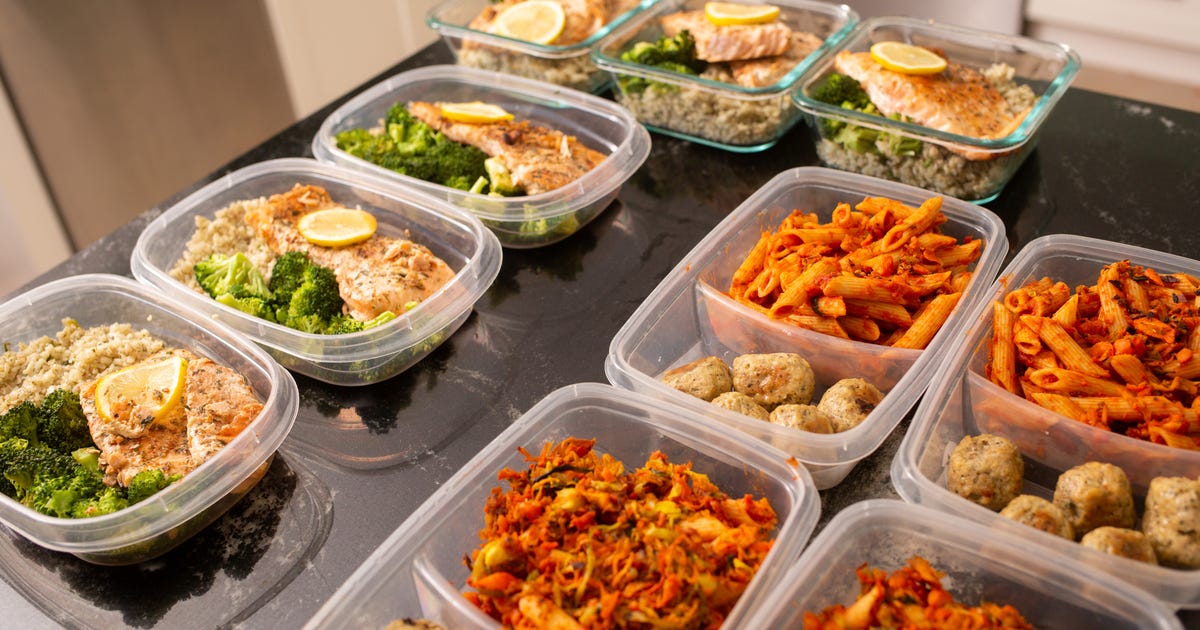
Do you meal prep the same meals each week? Laying out five containers of the same lunch and dinner for the week may be a popular — and easy – cooking option, but it has a few big drawbacks. Eating the same food all the time, especially if it’s not well–balanced, can deprive your body of nutrients it needs. Not to mention, it can be boring.
Find out all the reasons you should start adding more variety to your menu. If you’re looking for more tips on nutrition, learn about the foods that promote good gut health, how to eat a well-balanced diet on a budget and why dessert may actually be good for you.
Is it OK to eat the same meals each day?
Figuring out what to eat every day can be time consuming and downright exhausting. Not only does it require planning, but sometimes it requires an extensive amount of time cooking.
There’s a lot that goes into creating daily meals, and the more different things you eat, the more work it requires. Because of that, it can be attractive to meal prep a collection of dinners and lunches all at once to eat throughout the week. It takes the work out of mealtime each day and gives you more time to relax.
However, eating the same meals day in and day out may not be the best for your health, even if you’re eating healthy meals. For one, unless you’re eating perfectly rounded meals each day, chances are you’ll miss out on some needed nutrients by not diversifying your plate. You may also be hindering your gut microbiome or even preventing you from losing weight if you’re trying to do so.
Health concerns to consider

wmaster890/ Getty Images
Eating everything the same day after day may be easy on your schedule, but your body greatly benefits from variety. A variety in diet can help your microbiome, ensure you’re getting all your needed vitamins and nutrients and can keep your palate entertained. After a while, it certainly gets boring to eat repetitively — plus this can affect weight loss if you’re trying to shed a few pounds. Here’s what you need to know.
Poor gut health
When you change up what you’re eating with every meal, your gut gets all kinds of different bacteria — and that’s a good thing! Studies have shown that various bacteria can keep your gut healthy, especially if you’re eating the right foods with the right combination of good bacteria. When you eat the same thing constantly, you’re not giving your microbiome the chance to experience new bacteria, which means you can get sick more often. Even worse, if you’re eating the same poor-quality, unhealthy food constantly, your gut has even less of a chance of cycling through the right bacteria to keep you healthy.
Possible vitamin deficiencies
The FDA has a guideline for what adults should get in terms of vitamins each day, whether it’s through food or supplements. Most likely, you won’t be getting the full recommended daily value of every single vitamin your body needs — for heart health, bone health and more — if you’re eating the same meals day in and day out. Though taking daily vitamins as supplements can help your body get what it needs, research has shown that supplements aren’t always as effective as getting your vitamins from food. By varying the food you’re eating each day, you can make sure your body is getting all the vitamins you need with minimal supplementation.
Missing out on key nutrients
Similarly to the way the same meals can deprive you of vitamins you need each day, they can also deprive you of other nutrients, like protein and fiber. Again, because your meals likely aren’t hitting on every single value you need each day of vitamins and nutrients, you could be missing out on getting enough of these things. Your body needs sufficient protein to keep all its cells healthy — and to create new cells — and your body needs fiber to regulate blood sugar.
Fiber also helps keep you regular, and if you’re not ingesting enough of it, you can get backed up. Other nutrients your body gets from food are carbohydrates and fat, both of which give your body energy. While these words may sound “bad” if you’re dieting, your body does, in fact, need these things to keep your whole system in check. It’s just a matter of choosing the right sources to keep you healthy.
Losing opportunities to expand your palate
At the end of the day, meal-prepping the same meal for every day or every week may be easy, but it’s boring. There are so many amazing foods to be had around you, and every day is a new opportunity to try something new. Even if you are a picky eater and don’t want to stray too far outside your comfort zone, you can change up how you prepare your food and what sides you include.
Expanding your horizons — and your palate — can make mealtime more interesting. This is also an opportunity to make sure you’re eating a well-balanced diet with all the necessary vitamins and nutrients your body needs. Plus, if you’re looking to lose weight, changing up how you get your nutrients can help your body to continue to burn fat and shed pounds.
If you’re looking to liven up your palate, try checking out your local farmers market for new ingredients to cook with or try a meal delivery service. These meal kits are a great way to try new foods that you can recreate later.
Bottom line
Creating a diet out of whole, diverse foods can not only ensure your body is getting all the nutrition it needs, but it keeps your stomach and brain satisfied. Preparing a variety of healthy foods can keep your body healthy in a number of ways and it will continue to keep mealtime interesting. Even if you’re looking to save time on meal-prep, you can still change it up with what you’re preparing so you’re always giving your body exactly what it needs.
The information contained in this article is for educational and informational purposes only and is not intended as health or medical advice. Always consult a physician or other qualified health provider regarding any questions you may have about a medical condition or health objectives.
